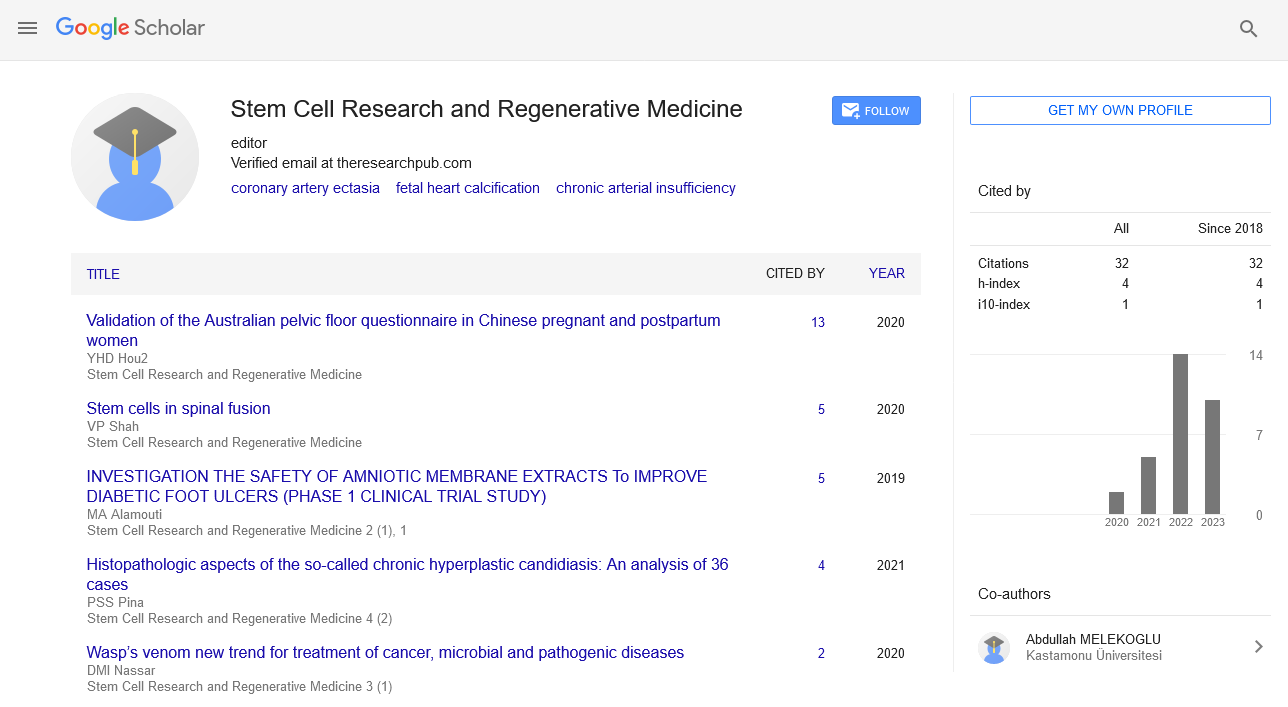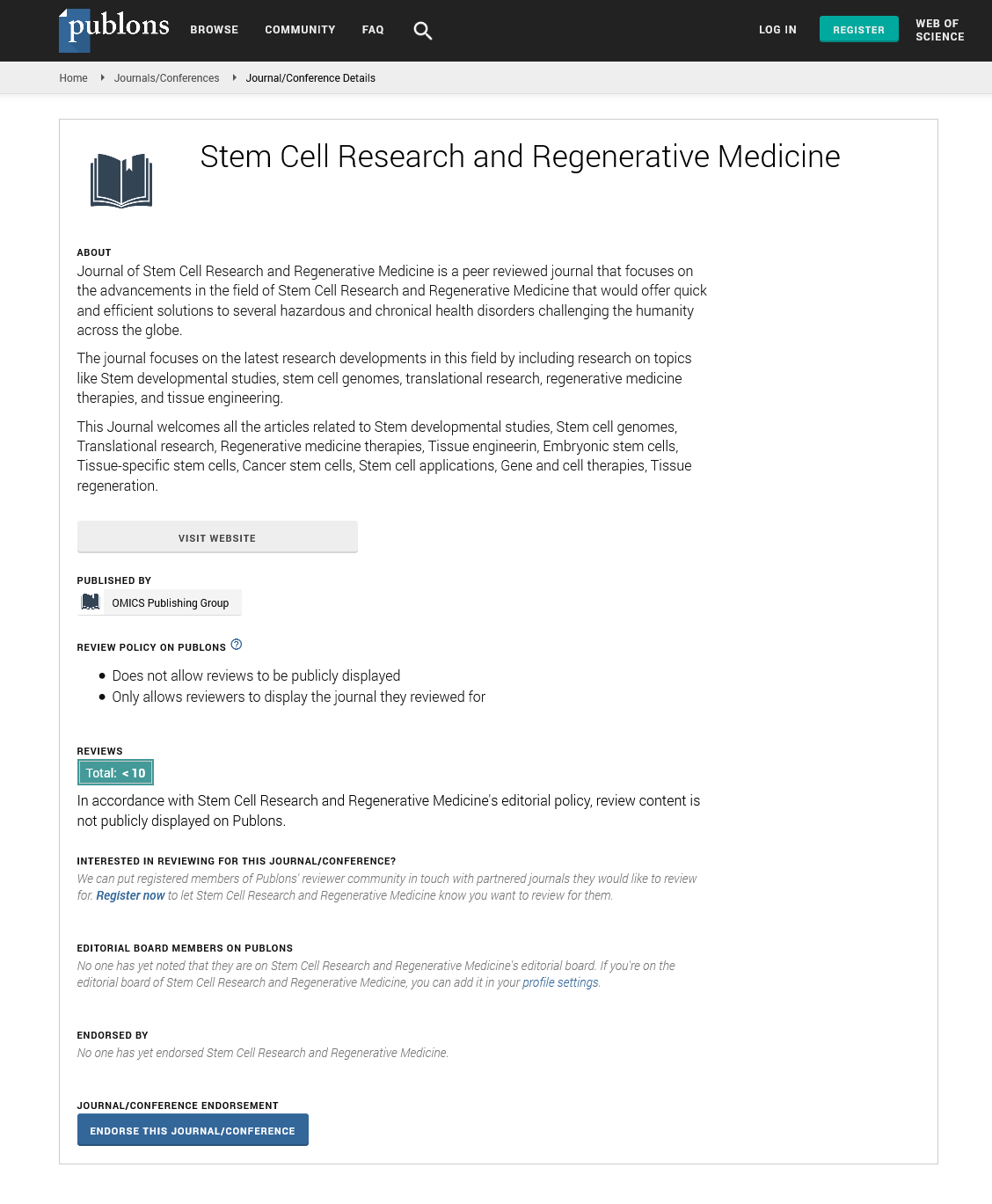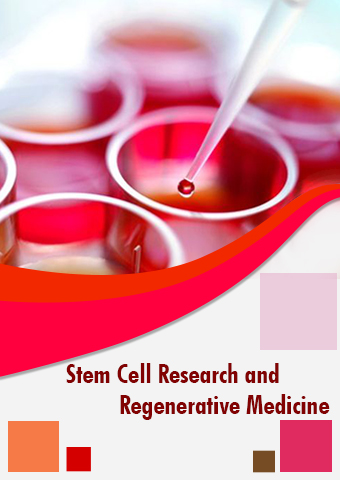Opinion Article - Stem Cell Research and Regenerative Medicine (2023) Volume 6, Issue 5
Advancements in Regenerative Medicine: Transforming Healthcare for a Healthier Tomorrow
- Corresponding Author:
- Lin Ding
Department of Health, Southern Cross University, Australia
E-mail: lin@srtmcs.com.au
Received: 18-Sep-2023, Manuscript No. SRRM-23-119107; Editor assigned: 21-Sep-2023, Pre QC No. SRRM-23-119107 (PQ); Reviewed: 04-Oct-2023, QC No. SRRM-23- 119107; Revised: 11-Oct-2023, Manuscript No. SRRM-23-119107 (R); Published: 21-Oct-2023, DOI: 10.37532/SRRM.2023.6(5).123-124
Introduction
Regenerative medicine: A paradigm shift in healthcare
Regenerative medicine is a ground breaking field that holds the promise of revolutionizing healthcare by harnessing the body’s innate regenerative capabilities to treat a wide range of medical conditions. Unlike traditional medical approaches that often focus on symptom management, regenerative medicine seeks to restore damaged tissues, organs, and systems to their optimal functioning. In this comprehensive exploration, we will delve into the key principles, cuttingedge techniques, and the potential impact of regenerative medicine on human health.
Description
The core principles of regenerative medicine
Regenerative medicine is rooted in several core principles, which collectively form the foundation of its transformative approach:
Cellular therapy: A central concept in regenerative medicine is the use of cells to repair and regenerate damaged tissues. Stem cells, in particular, are a focus of research, as they can differentiate into various cell types and have the potential to replace or repair damaged cells.
Tissue engineering: This approach involves creating artificial organs or tissues in the laboratory and implanting them into the body. Tissue engineering can offer solutions for patients in need of organ transplants.
Biomaterials: Scaffolds and biomaterials are used to support the growth of new cells and tissues. These materials provide the necessary structure and cues for cells to regenerate in a controlled manner.
Gene therapy: Genetic modifications can be used to encourage cells to behave in certain ways, enhance their regenerative abilities, or correct genetic defects that lead to diseases.
Small molecules: Some regenerative therapies utilize small molecules that can stimulate repair and regeneration processes in the body.
Emerging applications of regenerative medicine
Regenerative medicine has made significant strides in treating various medical conditions and is showing promise in several key areas:
Organ transplantation: Donor organ shortages have driven research into creating artificial organs, such as artificial hearts and kidneys, using tissue engineering and regenerative techniques. These breakthroughs have the potential to save countless lives.
Neurological disorders: Stem cell therapies are being investigated for conditions like Parkinson’s disease, Alzheimer’s disease, and spinal cord injuries. They offer the possibility of replacing damaged or degenerated nerve cells.
Orthopaedics: Regenerative therapies, including Platelet-Rich Plasma (PRP) injections and mesenchymal stem cell treatments, are being used to promote healing and tissue repair in orthopaedic injuries, such as joint problems and tendon injuries.
Cardiovascular health: Stem cell therapies are being explored for heart conditions, aiming to repair damaged cardiac tissue and restore heart function in individuals with heart disease.
Diabetes: Regenerative medicine is making strides in the treatment of diabetes by developing methods to restore insulin-producing cells in the pancreas and provide better glucose control for patients.
Skin regeneration: Advances in regenerative medicine have led to innovations in skin grafts, helping burn victims and patients with chronic wounds to heal more effectively.
The road to personalized medicine
One of the most exciting aspects of regenerative medicine is its potential to offer personalized treatments tailored to an individual’s unique genetic makeup and medical history. Personalized regenerative therapies could maximize effectiveness while minimizing side effects, making treatments safer and more successful.
Challenges and ethical considerations
As regenerative medicine continues to advance, it faces several challenges and ethical considerations:
Safety: Ensuring the safety of regenerative therapies is crucial. Rigorous testing and clinical trials are necessary to confirm the safety and efficacy of these treatments.
Ethical use of stem cells: The use of embryonic stem cells raises ethical questions, and there is an on-going debate about their source and usage.
Regulatory framework: Regenerative medicine requires a clear regulatory framework to oversee research, development, and clinical applications. This framework should ensure that new therapies are safe, effective, and accessible to those who need them.
Cost and accessibility: Making regenerative therapies widely accessible and affordable is a significant challenge. Addressing these issues will be vital to realizing the full potential of regenerative medicine.
The future of regenerative medicine
The future of regenerative medicine holds immense promise. As research and development continue, we can anticipate several key developments:
Breakthrough treatments: Regenerative medicine is likely to yield breakthrough treatments for conditions that were previously considered incurable or difficult to manage.
Enhanced longevity: By addressing the root causes of age-related degeneration, regenerative therapies may extend human lifespan and improve the quality of life in old age.
Integration with traditional medicine: Regenerative medicine is expected to complement traditional medical approaches, providing a holistic and comprehensive healthcare strategy.
Customized healthcare: Advances in genomics will enable personalized regenerative therapies, offering treatment plans that are tailored to an individual’s genetic makeup and specific health needs.
Global collaboration: International collaboration will become increasingly important to advance regenerative medicine research and ensure the equitable distribution of these therapies.
Ethical and legal frameworks: Ethical considerations and regulatory frameworks will evolve to support the responsible development and application of regenerative medicine.
Conclusion
Regenerative medicine represents a transformative shift in healthcare, offering the potential to address the root causes of diseases and conditions. It stands to benefit millions of individuals by providing innovative treatments and improving their quality of life. As research continues and ethical considerations are addressed, regenerative medicine is poised to revolutionize healthcare, paving the way for a healthier and more prosperous future. While challenges remain, the continued dedication of researchers and the collaboration of the global scientific community are driving this field forward, inching closer to a new era of healthcare and well-being.


